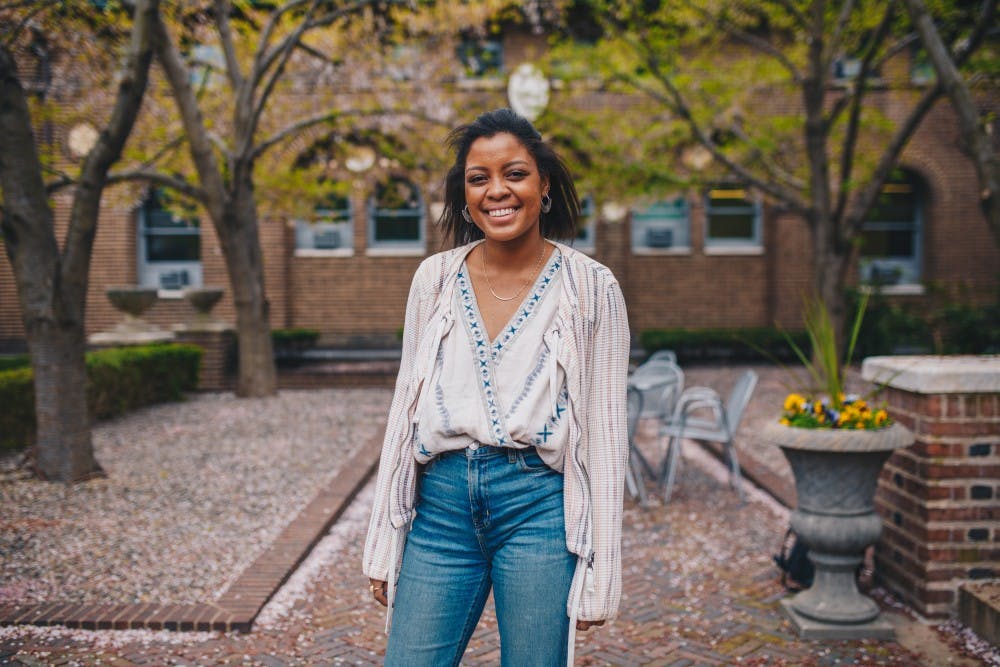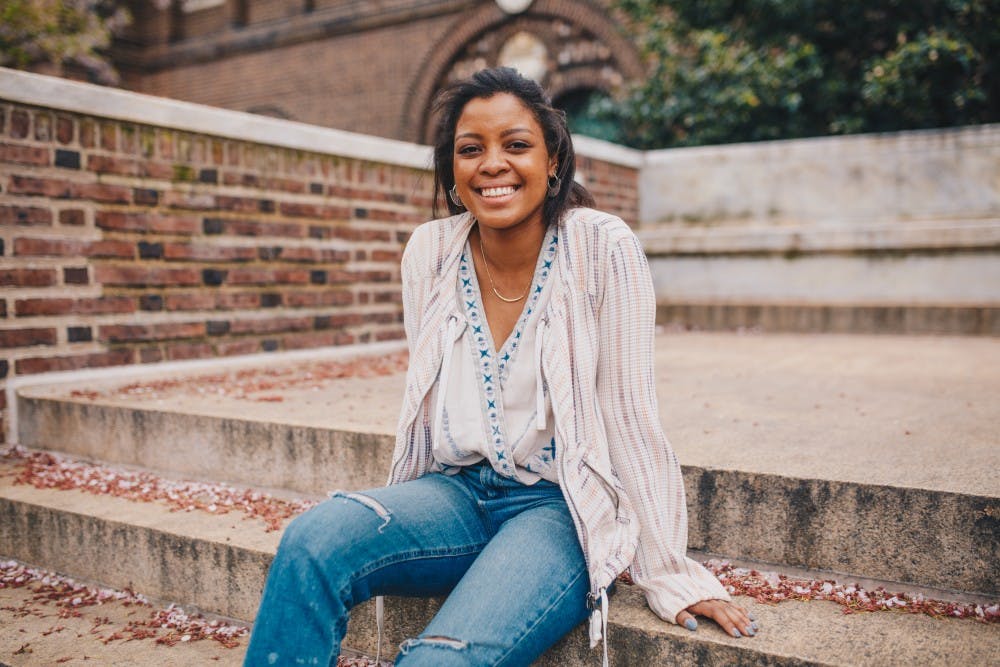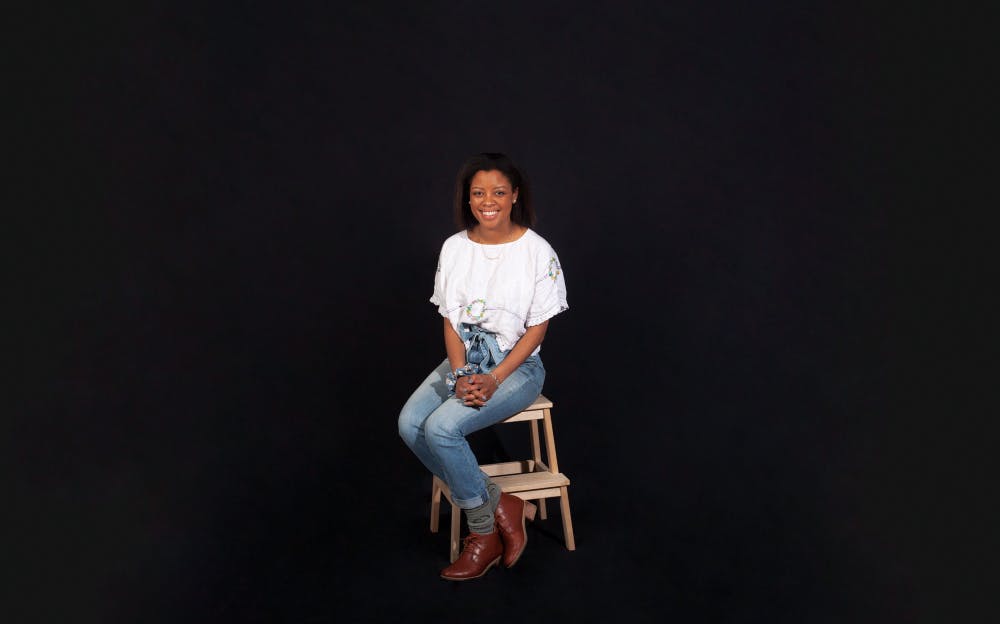“At last…”
The lights rise, spotlighting Karis as she sings to a full house at Iron Gate Theater. “At last…” her voice rings out, and the drawn out beginning of Etta James’ iconic ode to love mimics some of Karis Stephen's own life: at last, her final show with the a cappella group, Counterparts; at last, she hands off the baton to the After School Arts Program; at last, she is making real decisions about what her future looks like, graduating and leaving all this behind.
I meet up with Karis at the side door of the theater before her final show. We settle into a corner beneath the mirror in the sweaty basement room that serves as the Counterparts greenroom. Her group mates flit around, humming songs from the set and changing from casual slides into sultry heels and snappy dress shoes. “What do you think about my hair up in this dress?” The room decides her hair looks better down, and she leaves it, giving herself a final glance in the mirror above me before straying back to the loose circle of people in the middle of the room. There’s a warm and intimate energy in the room, the kind that comes from nerves, familiarity, and tight spaces, particularly of the church basement variety.
“Counterparts has been the thing that I’ve been in consistently since freshman year, that I go to every single week, so the people in it are actually my family at this point,” she says, a point proven when in the middle of our interview a boy from the group buzzes over and plants a kiss on her right temple. “Coming from Tyler, TX, where literally nobody goes to Penn, I knew nobody, and then joined this a cappella group and was suddenly like, wow, I have 14 immediate, close friends!”
While Karis knew nobody coming into Penn, she at least thought she knew what she wanted to study: International Relations. “I don’t know why I said that,” she laughs. “I think I was like, I’m going to go to college and expand my worldview.” But then she took an English class, loved it, and declared that as her major instead, tacking on Cinema and Media studies at the beginning of her junior year. Her first semester, she took a class on music, poetry, and literature, which helped her discover academic intersectionality, “where you can study more than one thing in conjunction with each other, and find how they parallel one another and how different fields can work together.”
She’s carried this philosophy throughout her time at Penn. “I guess I always have found the intersections between different academic fields to be so much more interesting than the fields themselves,” she says. Her thesis analyzes Afrofuturism, the works of Erykah Badu, and Sun Ra, combing her music minor and the three things she loves most: literature, film, and music.
These interests are developed outside of the classroom as well. “Writing music is absolutely one of my favorite things to do,” she says.“I was really into writing poetry, and finding that poetry and music go really hand and hand and that my ability to write was useful in the music space was a huge realization.” She and her boyfriend, Blue Bookhard, form the musical duo Eleven, where Karis writes and produces her own music. The project was born out of a conversation between the two, becoming a type of creative salvation for them both. “I feel like I’m not making anything, and it’s really frustrating,” she had said. “I feel like Penn’s suffocating me because I can’t be creative in my classes.” In turn, Blue responded: “Let’s do something about it.” And so they did.

The duo officially took off as an independent study crafted under the mentorship of professor Guy Ramsey. “We called it 'Music Industry' or something?” she says. “I don’t even know what the class is called—" but she describes the process as “kind of experimental” with her and Blue leading themselves through “all the steps of being a musician,” with Ramsey as a mentor. Together, they learned about marketing, music promotions, booking gigs, writing music, recording music, and then getting the music mixed and mastered.
After they released the music video for their first song, “Step Forward,” it started feeling like more than just a class for Karis—“I was like, oh my god, we’re actually a music group, this isn’t just a class!” She and Blue were both surprised but excited about the response to their music—and even the negative feedback had a positive impact on them and their creative process. “I think the reason we both like music and performing is because we love to see the reaction from the audience. Even if someone hates it, that’s awesome, because we made them feel something, you know?”
The 2 million streams of “All Mine,” their collaboration with French electronic group Sense, cemented the reality of their success. “It was a really surreal experience,” Karis recalls, describing how she woke up at home alone with her parents to her phone blowing up with messages—“everyone was kind of confused as to what was happening—like, “What’s going on? Why are we on New Music Friday? I don’t understand!’” Her parents love the song—“My dad like, plays it constantly now, which is really cute.” Over winter break she faced constant questions of “What’s the stream number?” She laughs and says, “They don’t even know what streams are! They’re really adorable. I love them.”
Reflecting on the experience, Karis says, “That’s when it felt really real, and now that all this is happening, it’s like, oh my gosh, this can be more than just a short term thing. This can go long term.”

On the other side of her time at Penn is her work with education and arts activism, a passion that grew out of her own childhood. “When I was a kid, I was incredibly shy,” she says. “What really got me out of that was music. It gave me a confidence and a sense of self...I think it’s a tool for kids to learn who they are, which is why I really care about teaching it.” She formerly ran the After School Arts Program, a weekly program that brings Philadelphia students to Platt Performing Arts Center where they get to engage in different subjects, including: theater, singing, “or just jamming.”
Karis plans to carry on her service in arts education after college through a Fulbright grant that will take her to Malaysia. “I’ve always felt like I wanted to do something good, and something that actually makes a difference,” she says. “This is a way for me to dedicate less than a year of my life to doing that.”
She’ll be in Malaysia for ten months, which gives her enough time to think about what she wants pursue. “I don’t think I'm gonna want to go to corporate America,” she says. In November she was offered a job at Facebook in Chicago, but she turned it down. “Who knows? Maybe I want to go the non-profit route.”
When I ask if she’s ready to graduate, she sighs, says yes, and then laughs. “Short answer: yes. I think I’ve really loved Penn. Yes it has systemic issues that pervade everything, but it’s given me people and opportunities I don’t know that I would have gotten otherwise, and I’m very happy I came here.”
Back on stage, Karis is finishing off the last bars of her song, and the lyrics echo her sentiments about rounding off her time at Penn and leaving campus—“I found a dream that I could speak to, a dream that I could call my own…” The lights dim and the crowd cheers, a swell in the audience as Karis belts out the last line of her last song at her last show:
“At last.”
Read about the rest of the students profiled for 34th Street Magazine's Penn 10 project here.

